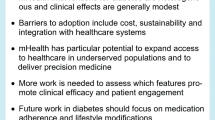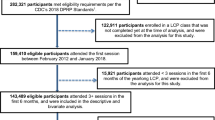Abstract
Objectives
Type 1 diabetes (T1D) adolescents often do not achieve good glycemic control. In the context of growing number of technologically savvy adolescents, this study was done to examine the effectiveness of a motivational smartphone app to improve their glycemic control.
Methods
Eleven to eighteen year old adolescents, treated by Pediatric endocrine team of CMC, Vellore, who had T1D ≥ 1 y duration with poor glycemic control (mean HbA1c ≥ 8.5% in preceding 12 mo) were recruited. An app programmed to provide 3 reminders per day regarding insulin, meals and physical exercise was installed on their phone. Diabetes management was continued as per the standard of care. HbA1C was measured after 3 mo.
Results
Thirty seven adolescents were recruited; 3 were excluded as the app became non-functional. Seventeen were boys, mean age was 13.8 y (11–18 y) and mean duration of diabetes was 4.9 y (0.8–16 y). The mean HbA1c levels over preceding 12 mo and at recruitment were 10.75% (1.88) and 10.6% (2.08) respectively. Twenty eight participants returned for repeat HbA1C after 3–4 mo. As compared to baseline there was significant reduction in HbA1c level: 10.6% (2.08) vs. 9.65% (1.6); p = 0.004. Twenty two of twenty eight participants showed reduction in HbA1c after app installation. The magnitude of change in HbA1c levels over a 3 mo period before and after the app use was analyzed. There was significant difference between mean HbA1c levels before and after app use; +0.28 (2.06) vs. −0.914 (1.52); p = 0.019.
Conclusions
Following usage of smartphone app as a motivational intervention in adolescents with Type 1 diabetes, there was significant reduction in HbA1c level after 3 mo. With continued use, this may benefit them to achieve target HbA1c levels. Use of mobile phone apps as motivational interventions is feasible in adolescents with Type 1 diabetes in India.

Similar content being viewed by others
References
Karuranga S. Fernandes JdaR, Huang Y, Melanda B. IDF Diabetes Atlas, 8th ed. Brussels, Belgium: International Diabetes Federation; 2017.
Kumar KMP. Incidence trends for childhood type 1 diabetes in India. Indian J Endocrinol Metabol. 2015;19:S34–5.
DiMeglio LA, Acerini CL, Codner E, et al. ISPAD clinical practice consensus guidelines 2018: glycemic control targets and glucose monitoring for children, adolescents, and young adults with diabetes. Pediatr Diabetes. 2018;19:105–14.
American Diabetes Association. 12 Children and adolescents: standards of medical care in diabetes-2018. Diabetes Care. 2018;41:S126–36.
Ghosh M. 204M Smartphone Users In India By 2016. Will Surpass US: EMarketer. Trak.in. Telecom. Dated 23rd December 2014.
Ryan EA, Holland J, Stroulia E, et al. Improved A1C levels in type 1 diabetes with smartphone app use. Can J Diabetes. 2017;41:33–40.
How mobile health can help tackle the diabetes epidemic and strengthen health systems. International Diabetes Federation (IDF) response to the public consultation on the European Commission's Green Paper on mobile health. Diabetes Res Clin Pract. 2014;105:271–2.
WHO: World Health Organization. mHealth: New Horizons for Health Through Mobile Technologies: Second Global Survey on eHealth. 2011.
Wong CK, Fung CS, Siu SC, et al. A short message service (SMS) intervention to prevent diabetes in Chinese professional drivers with pre-diabetes: a pilot single-blinded randomized controlled trial. Diabetes Res Clin Pract. 2013;102:158–66.
Bin Abbas B, Al Fares A, Jabbari M, El Dali A, Al OF. Effect of mobile phone short text messages on glycemic control in type 2 diabetes. Int J Endocrinol Metab. 2015;13:e18791.
Arora S, Peters AL, Burner E, Lam CN, Menchine M. Trial to examine text message-based mHealth in emergency department patients with diabetes (TExT-MED): a randomized controlled trial. Ann Emerg Med. 2014;63:745–54.e6.
Fukuoka Y, Gay CL, Joiner KL, Vittinghoff E. A novel diabetes prevention intervention using a mobile app: a randomized controlled trial with overweight adults at risk. Am J Prev Med. 2015;49:223–37.
Quinn CC, Shardell MD, Terrin ML, Barr EA, Ballew SH, Gruber-Baldini AL. Cluster-randomized trial of a mobile phone personalized behavioral intervention for blood glucose control. Diabetes Care. 2011;34:1934–42.
Drion I. The effects of a mobile phone application on quality of life in patients with type 1 diabetes mellitus: a randomized controlled trial. J Diabetes Sci Technol. 2015;9:1086–91.
Berndt RD, Takenga C, Preik P, et al. Impact of information technology on the therapy of type-1 diabetes: a case study of children and adolescents in Germany. J Pers Med. 2014;4:200–17.
Clements MA, Staggs VS. A mobile app for synchronizing glucometer data: impact on adherence and glycemic control among youths with type 1 diabetes in routine care. J Diabetes Sci Technol. 2017;11:461–7.
Frøisland DH, Arsand E, Skårderud F. Improving diabetes care for young people with type 1 diabetes through visual learning on mobile phones: mixed-methods study. J Med Internet Res. 2012;14:e111.
Goyal S, Nunn CA, Rotondi M, et al. A mobile app for the self-management of type 1 diabetes among adolescents: a randomized controlled trial. JMIR Mhealth Uhealth. 2017;5:e82.
Rami B, Popow C, Horn W, Waldhoer T, Schober E. Telemedical support to improve glycemic control in adolescents with type 1 diabetes mellitus. Eur J Pediatr. 2006;165:701–5.
Franklin VL, Waller A, Pagliari C, Greene SA. A randomized controlled trial of sweet talk, a text-messaging system to support young people with diabetes. Diabet Med. 2006;23:1332–8.
Mulvaney S, Anders S, Smith AK, Pittel EJ, Johnson KB. A pilot test of a tailored mobile and web-based diabetes messaging system for adolescents. J Telemed Telecare. 2012;18:115–8.
Pinsker JE, Nguyen C, Young S, Fredericks GJ, Chan D. A pilot project for improving paediatric diabetes outcomes using a website: the pediatric diabetes education portal. J Telemed Telecare. 2011;17:226–30.
Kowalska A, Piechowiak K, Ramotowska A, Szypowska A. Impact of ELKa, the electronic device for prandial insulin dose calculation, on metabolic control in children and adolescents with type 1 diabetes mellitus: a randomized controlled trial. J Diabetes Res. 2017;1–9. https://doi.org/10.1155/2017/1708148.
Boogerd EA, Noordam C, Kremer JA, Prins JB, Verhaak CM. Teaming up: feasibility of an online treatment environment for adolescents with type 1 diabetes. Pediatr Diabetes. 2013;15:394–402.
Pfammatter A, Spring B, Saligram N, et al. mHealth intervention to improve diabetes risk behaviors in India: a prospective, parallel group cohort study. J Med Internet Res. 2016;18:e207.
Ramachandran A, Snehalatha C, Ram J, et al. Effectiveness of mobile phone messaging in prevention of type 2 diabetes by lifestyle modification in men in India: a prospective, parallel-group, randomised controlled trial. Lancet Diabetes Endocrinol. 2013;1:191–8.
Muralidharan S, Ranjani H, Anjana RM, Allender S, Mohan V. Mobile health technology in the prevention and management of type 2 diabetes. Indian J Endocrinol Metab. 2017;21:334–40.
Wu Y, Yao X, Vespasiani G, et al. Mobile app-based interventions to support diabetes self-management: a systematic review of randomized controlled trials to identify functions associated with glycemic efficacy. JMIR Mhealth Uhealth. 2017;5:e35.
Knox ECL, Quirk H, Glazebrook C, Randell T, Blake H. Impact of technology-based interventions for children and young people with type 1 diabetes on key diabetes self-management behaviours and prerequisites: a systematic review BMC Endocrine Disord. 2019;19:7.
Diabetes Control and Complications Trial Research Group, Nathan DM, Genuth S, Lachin J, et al. The effect of intensive treatment of diabetes on the development and progression of long-term complications in insulin-dependent diabetes mellitus. N Engl J Med, 1993. 329:977–86.
Diabetes Control and Complications Trial (DCCT)/Epidemiology of Diabetes Interventions and Complications (EDIC) Study Research Group. Intensive diabetes treatment and cardiovascular outcomes in type 1 diabetes: the DCCT/EDIC study 30-year follow-up. Diabetes Care. 2016;39:686–93.
Hirsch IB, Parkin CG. Unknown safety and efficacy of smartphone bolus calculator apps puts patients at risk for severe adverse outcomes. J Diabetes Sci Technol. 2016;10:977–80.
Acknowledgements
The authors would like to acknowledge Mr. Matha Venkateswara Sai Vara Prasad, BTech (BPUT), Co-Founder, Director Technical, Epsum Labs Private Ltd. who designed the DMCare app using free license software. They also acknowledge their diabetes nurses Mrs. Marthal, Mrs. Ida and Mrs. Gnanasoundari who helped with the recruitment of study participants.
Author information
Authors and Affiliations
Contributions
BKP, JAJ and VJM proposed the study, contributed to app designing, app installation & follow-up, analysis and manuscript writing. SM, SK and AS contributed to study design, follow-up of participants, critical analysis of results and manuscript editing. SM is the guarantor for this paper. BKP, JAJ and VJM have contributed equally to the study and are joint first authors for the study.
Corresponding author
Ethics declarations
Conflict of Interest
None.
Additional information
Publisher’s Note
Springer Nature remains neutral with regard to jurisdictional claims in published maps and institutional affiliations.
Binay Kumar Pramanik, J. Jebashini Angelin, and Vineeth John Mathai are joint primary authors.
Rights and permissions
About this article
Cite this article
Pramanik, B.K., Angelin, J.J., Mathai, V.J. et al. Smartphone App as Motivational Intervention to Improve Glycemic Control in Adolescents with Type 1 Diabetes. Indian J Pediatr 86, 1118–1123 (2019). https://doi.org/10.1007/s12098-019-03035-x
Received:
Accepted:
Published:
Issue Date:
DOI: https://doi.org/10.1007/s12098-019-03035-x




